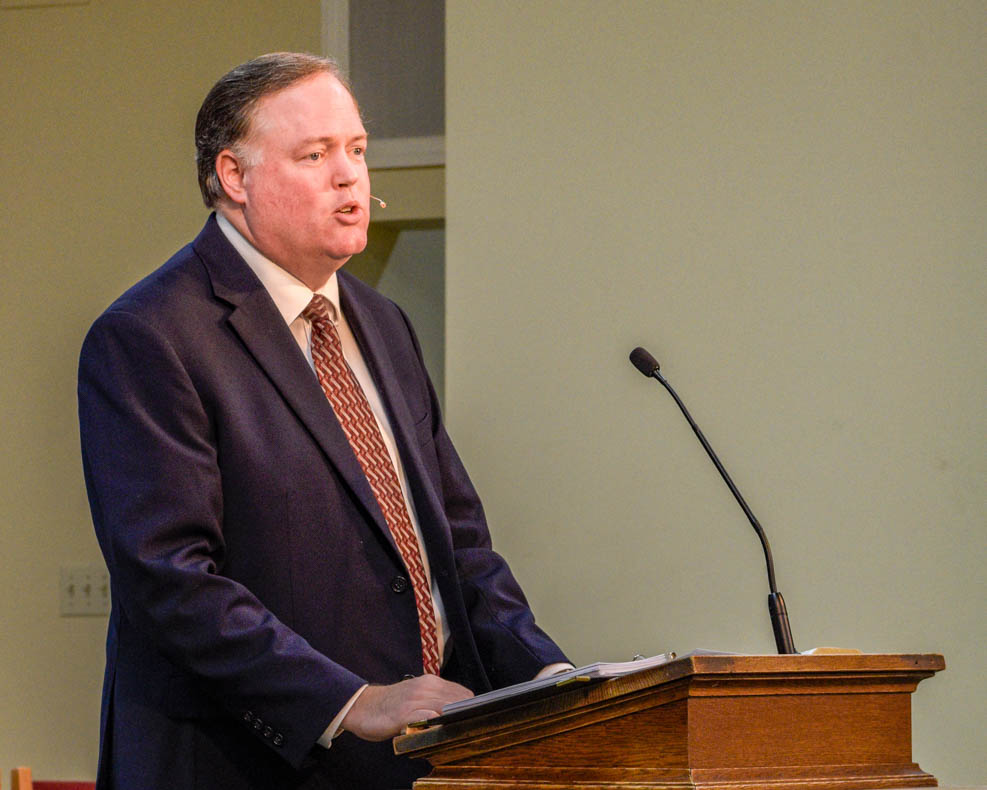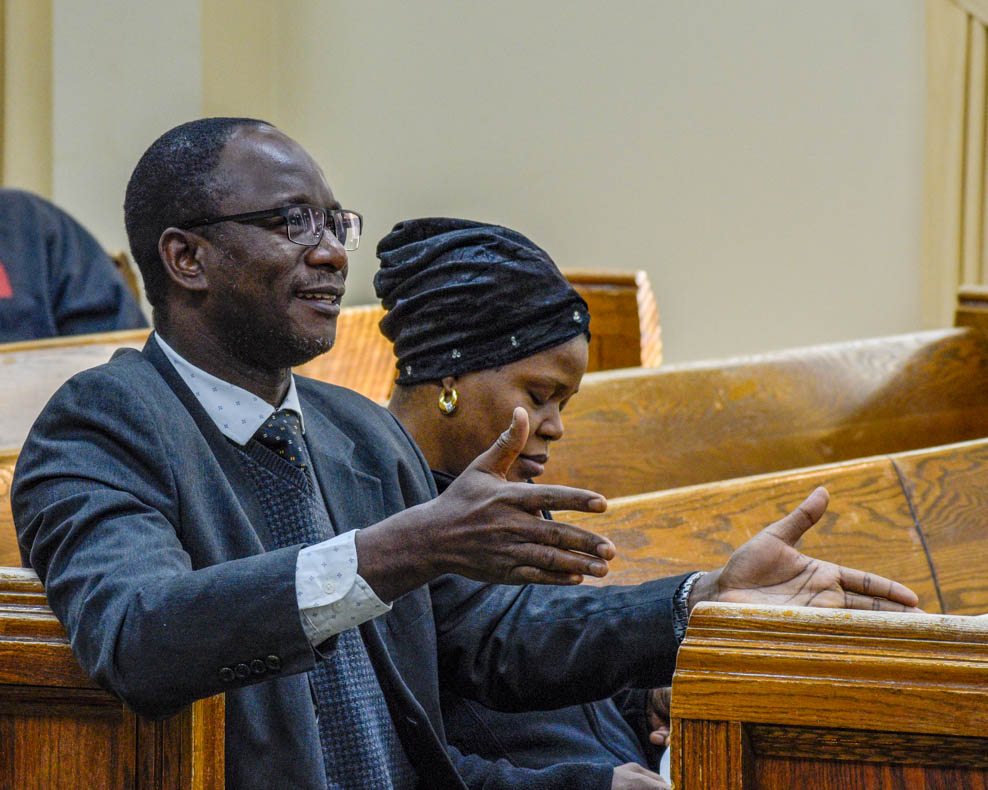WHAT WE BELIEVE
Our Mission
“Being aware of the love of God we endeavor to glorify Him by fulfilling the Great Commission”
The Scriptures
We believe in the verbal and plenary (complete in every part) inspiration of the Old and New Testaments of the Bible by the Holy Spirit,a in their original manuscripts. They are without error and are reliable in science, history and every other matter they discuss. The Bible is the supreme and final authority in all matters of faith and practice.
a 2 Timothy 3:16-17; 2 Peter 1:19-21
The True God
We believe there is only one living and true God,a infinite in every excellence.b In this unity, however, there is a trinity—the Father, the Son, and the Holy Spirit. Though one in being or essence, they are three distinct persons who are co-eternal in being, co-identical in nature, and co-equal in power and glory.c
We believe the Father is Godd and is the initiator of our salvatione and hears and answers prayer.f He saves from hell all who come to Him through Jesus Christ.g
Jesus Christ
We believe in the absolute deity of the Lord Jesus Christ;h His eternal existence;i His incarnation by means of the virgin birth;j His sinlessness;k His vicarious deathk through the shedding of His blood as an atonement for the remission of our sins;l His literal, bodily resurrection from the dead;m His ascension;n His present high-priestly ministry in heaven for believers;o and His personal, visible return to earth.p
The Holy Spirit
We believe the Holy Spirit is a divine person, equal with the Father and Son and of the same nature;q He convicts the world of sin, righteousness, and judgment;r He bears witness to the Truth;r He is the agent of the new birth;s all true believers are baptized in Him into the body of Christ;t He indwells and sanctifies all believers,u sealing and thus securing them unto the day of redemption;v He guides, teaches, and helps believers;w and it is the privilege and duty of all the saved to be filled with the Spirit.x
The Devil, Or Satan
We believe in the distinct personality of Satan. As a fallen angel,a he is the adversary of Godb and slanderer of the Christian.c He is the unholy god of this age,d author of the powers of darkness and sin,e and destined for the judgment of an eternal justice in the Lake of Fire.f
a Ezekiel 28:1–19 b Matthew 4:1-11 c Job 1:6–9 d 2 Corinthians 4:4; 1 Peter 5:8 e Ephesians 2:2 f Revelation 20:10
The Creation
We believe God created the heavens and the earth, including all life, “each after its own kind,” by direct act in six days.a
a Genesis 1 & 2; John 1:3; Colossians 1:16–17; Hebrews 11:3
The Fall Of Man
We believe God created man, in the person of Adam,a in His own image.b Man enjoyed unbroken fellowship with God; however, he disobeyed God and plunged the human race into a state of condemnation and deathc and caused all of creation to be placed under the bondage of corruption.d As a result, all human beings are guilty by naturee and practicefand will stand before God without excuse.g
a Genesis 2:7, 15, 19 b Genesis 1:26–27 c Genesis 3 d Genesis 3; Romans 8:20–22 e Romans 5:10–19; Psalm 51:5 f Romans 1:18–32; Romans 3:10–23 g Romans 1:18–32
The Redemption from Sin
We believe Jesus came to shed his blood and die on the cross.a His voluntary atonement for the sins of mankind was substitutionary and sufficient for all.b He arose bodily the third dayc and now sits at the right hand of the Father interceding for us as Mediatordand High Priest.e
a 1 Peter 3:18; 1 Peter 1:18–19; Romans 5:8 b 1 Peter 3:18; Hebrews 2:9–18 c 1 Corinthians 15:4 d 1 Timothy 2:5 e Hebrews 4:14–15
Salvation by Grace
We believe repentance from sina and faith in the Lord Jesus Christb is the only condition of salvation from sin. This salvation is wholly by God’s grace. No works, however good, make the salvation any more merited or secure.c All who receive Jesus are regenerated by the Holy Spiritd and become children of God,e and nothing prevents the salvation of the greatest sinner on earth but his personal rejection of the Gospel.f
a Mark 1:15; Luke 13:3 b Mark 1:15; Acts 16:30–31; Romans 10:9–13 c Ephesians 2:8–9 d Titus 3:5–7 e John 1:12 f John 3:1–18
Security of the Believer
We believe in the eternal security of the believer.a A true believer can never be lost because of his adoption into God’s familyb and due to the sacrificial and high-priestly work of Jesus.c
a John 1:12; 3:1–17; 6:37;10:27–29; 1 John 5:10–13 b Romans 8:14–17 c Hebrews 10:10–12
Sanctification of the Believer
We believe every saved person possesses two natures: 1) that he has the old nature, inherited from Adam, for the duration of this earthly life,a and 2) that provision is made for victory of the new nature of Christ over the old natureb through the power of the indwelling Holy Spirit.c
We believe sanctification for the believer is immediate upon acceptance of Christ as Savior,d is progressive in the hearts and lives of believerse through the presence and power of the Holy Spirit,f and will be completed when we see Him.g
a Romans 7:15–25 b Romans 6:11–14 c Romans 8:1–14 d 1 Corinthians 1:2; 1 Corinthians 6:11; Hebrews 10:10 e 1 Thessalonians 4:1–7; Ephesians 4:11–16 f 1 Corinthians 6:11 g 1 Thessalonians 3:12–13; 5:23–24
Separation of the Believer
We believe all believers should live separated lives and abstain from all appearance of evil.a
We further believe in ecclesiastical separation. Our church and its individual members vow not to associate with any religious organization or movement that compromises the Gospel or contradicts any plain teaching of Scripture.b
a Matthew 5:13–16; Romans 12:1–2; Romans 12:9; 1 Thessalonians 5:22; 1 Peter 1:16; 1 Peter 3:10–11; 1 John 2:15–17 b Romans 16:17–18; 1 Corinthians 13:8, 13; 14:26–28, 33, 40; 2 Corinthians 6:14–7:1; Ephesians 5:11; 2 Thessalonians 3:14–15; Titus 3:10–11; 2 John 7–11
THE CHURCH
The Church
We believe the Church began at Pentecosta and is an organism composed of all true believers in Jesus Christ as Savior.b We believe the local church should be composed of baptized believers, voluntarily united for the purpose of worship, edification, observance of the ordinances, fellowship and the establishment of Christian education and service;c that among the necessary officers of the local church are pastors and deacons,d whose qualifications and duties are clearly defined in the Scriptures;e that the true mission of the church includes the faithful witnessing of Christ to all men as we have opportunity in the local community and around the world;f that the local church has the absolute right of self-government, free from the interference of any hierarchy of individuals or organizations, religious or governmental; that the one and only true Head is Christ;g that it is Scriptural for true churches to cooperate in defending the faith and for the furtherance of the Gospel, with each local church as the sole judge of the measure and method of its cooperation; that on all matters of membership, policy of government, discipline, and benevolence, the will of the local church is final.h
We believe men are to be the leaders (pastors and deacons) of the Church. Accordingly, only men are eligible for licensure and ordination by the Church.i
We believe anyone who practices sin and refuses to change is not a true believer and cannot be a member of this church.j
a Acts 1:4–8; 2:1–4, 38–39, 41–47 b see “a”; 1 Corinthians 12:12–31; Ephesians 1:20–23; Ephesians 3:1–10; Ephesians 5:25–33; Colossians 1:14–20 c Acts 2:41–47; Acts 11:26; Acts 13:1–5; Acts 20:7; 1 Corinthians 1:2; Colossians 3:5–17; Hebrews 10:24–25 d Philippians 1:1 e 1 Timothy 3:1–16; Titus 1:5–9; Hebrews 13:7, 17; 1 Peter 5:1–4; Acts 6:1–7 f Matthew 28:18–20; Acts 1:8 g Ephesians 4:11–16; Colossians 1:18; Ephesians 2:18–22 h Acts 11:29–30; Acts 13:1–4; Acts 15:1–31; Acts 20:28, 31; Philippians 4:14–16; 1 Corinthians 5:1–6:11 i 1 Timothy 3:1–16; Titus 1:5–9 j 1 Corinthians 5:1–6:20; Galatians 5:19–21; Ephesians 5:5–6; 1 John 3:4–10
Church Ordinances
We believe there are two church ordinances: Baptism and the Lord’s Supper. Scriptural baptism is the immersion of a believer in water,a setting forth, in symbol, his union with Christ in His death, burial, and resurrection;b that every believer should be baptized because of the examplec and commandd of our Lord; and while there is no saving power in water baptism,e it is an act of obedience for those willing to identify with their Lord and Savior and is a requirement for membership in this church.
We believe the Lord’s Supper is a commemoration of the Lord’s death until He comes again and should be open to all believers, who have been baptized by immersion, after self-examination.f
a Acts 2:41; Acts 8:36–39 b Romans 6:3–5 c Matthew 3:13–17 d Matthew 28:19–20 e John 5:24; Acts 19:2–5 f Luke 22:14–20; Acts 2:41–42; 1 Corinthians 11:23–32
The Return of Christ
We believe in the bodily,a personal,b pre-millennial, and imminent return of Jesus Christ.c
a Acts 1:11 b John 14:3 c Matthew 24:29–31; Matthew 24:42–44; 1 Thessalonians 4:13–18; Revelation 19:11–21; Revelation 20:1–6
The Resurrection and Eternal State
We believe all the souls of believers are, at death, absent from the body and present with the Lord,a where in conscious bliss they await the first resurrection.b After their participation in this resurrection unto life,c they will enjoy everlasting blessedness with immortal bodiesd in the presence of God.e
We believe the souls of unbelievers remain after death in conscious misery in hell until the second resurrection.f After their participation in this resurrection unto damnation,g they will be judged and consigned to suffer everlasting, conscious torment in the Lake of Fire.h
a 2 Corinthians 5:6–8 b 1 Thessalonians 4:13–18; Luke 16:19–31 c John 5:21–30 d Philippians 3:20–21; 1 Corinthians 15:42–57 e Revelation 22:1–5 f Luke 16:19–31 g John 5:28–29 h Revelation 20:5–6; Revelation 20:10–15
Civil Government
We believe God has ordained and created all authoritya consisting of three basic institutions: 1) the home,b 2) the church,c and 3) the state.d Every person is subject to these authorities, but all (including the authorities themselves) are answerable to God.e God has given each institution specific biblical responsibilities and balanced those responsibilities with the understanding that no institution has the right
to infringe upon the other. The home, the church, and the state are equal and sovereign in their respective biblically assigned spheres of responsibility under God.f
a Romans 13:1–7 b Genesis 2:21–24; Ephesians 5:31–33; Ephesians 6:1–3 c Ephesians 1:20–23; Ephesians 5:22–25; Hebrews 13:17 d Romans 13:1–7; Titus 3:1; 1 Peter 2:13–14, 17 e Romans 13:1–7; Ephesians 1:20–23 f This conclusion is reached from the preceding verses.
Human Sexuality
We believe that God has commanded that no intimate sexual activity be engaged in outside of a marriage between a man and a woman.a We believe that any form of homosexuality, lesbianism, bisexuality, bestiality, incest, fornication, adultery, and pornography are sinful perversions of God’s gift of sex.b
We believe that God disapproves of and forbids any attempt to alter one’s gender by surgery or appearance.c
a Genesis 2:24 b Genesis 19:5, 13, 24–25; Leviticus 18:1–30; Romans 1:26–32; 1 Corinthians 5:1; 1 Corinthians 6:9; 1 Thessalonians 4:1–8; Hebrews 13:4; Jude 7 c Matthew 19:4
Family Relationships
We believe that God has ordained the family as the foundational institution of human society.a The family is established solely by the joining in marriage of one man and one woman.b Men and women are spiritually equal in position before Godc but God has ordained distinct and separate spiritual functions for men and women in the homed and the church.e The husband is to be the leader of the home.f The husband is to love his wife as Christ loves the church.g The wife is to submit herself to the scriptural leadership of her husband as the church submits to the headship of Christ.h Children are a heritage from the Lord.i Parents are responsible for teaching their children spiritual and moral values and leading them, through consistent lifestyle example and appropriate discipline,j including scriptural corporal correction.k
We believe that God disapproves of and forbids divorce and intends marriage to last until one of the spouses dies.l Divorce and remarriage is regarded as adultery except on the grounds of fornication.m Although divorced and remarried persons or divorced persons may hold positions of service in the church and be greatly used of God for Christian service, they may not be considered for the offices of pastorn or deacon.o
a Genesis 2:21–24; Genesis 1:26–28; Mark 10:6–12; 1 Corinthians 7:1–16 b Genesis 2:24; Romans 7:2; 1 Corinthians 7:10 c Galatians 3:28 d Ephesians 5:22–25; Colossians 3:18–21; 1 Peter 3:1–7; Titus 2:3–5 e 1 Corinthians 14:26–40; 1 Timothy 2:8–15; 1 Timothy 3:1–13; Titus 1:5–9 f Ephesians 5:22–25; Colossians 3:18–21; 1 Peter 3:1–7 g Ephesians 5:21–33 h Colossians 3:18–21; 1 Peter 3:1–7; Ephesians 5:21–33 i Psalm 127:3–5 j Deuteronomy 6:4–9; Ephesians 6:4; Colossians 3:21 k Proverbs 19:18; Proverbs 22:15; Proverbs 23:13–14 l Malachi 2:14–17; Matthew 19:3–12; Romans 7:1–3 m Matthew 19:3–12; Romans 7:1–3 n 1 Timothy 3:2; Titus 1:6 o 1 Timothy 3:12


